人教版七年级下册英语 Unit 4 单元知识点复习学案(无答案)
文档属性
| 名称 | 人教版七年级下册英语 Unit 4 单元知识点复习学案(无答案) | 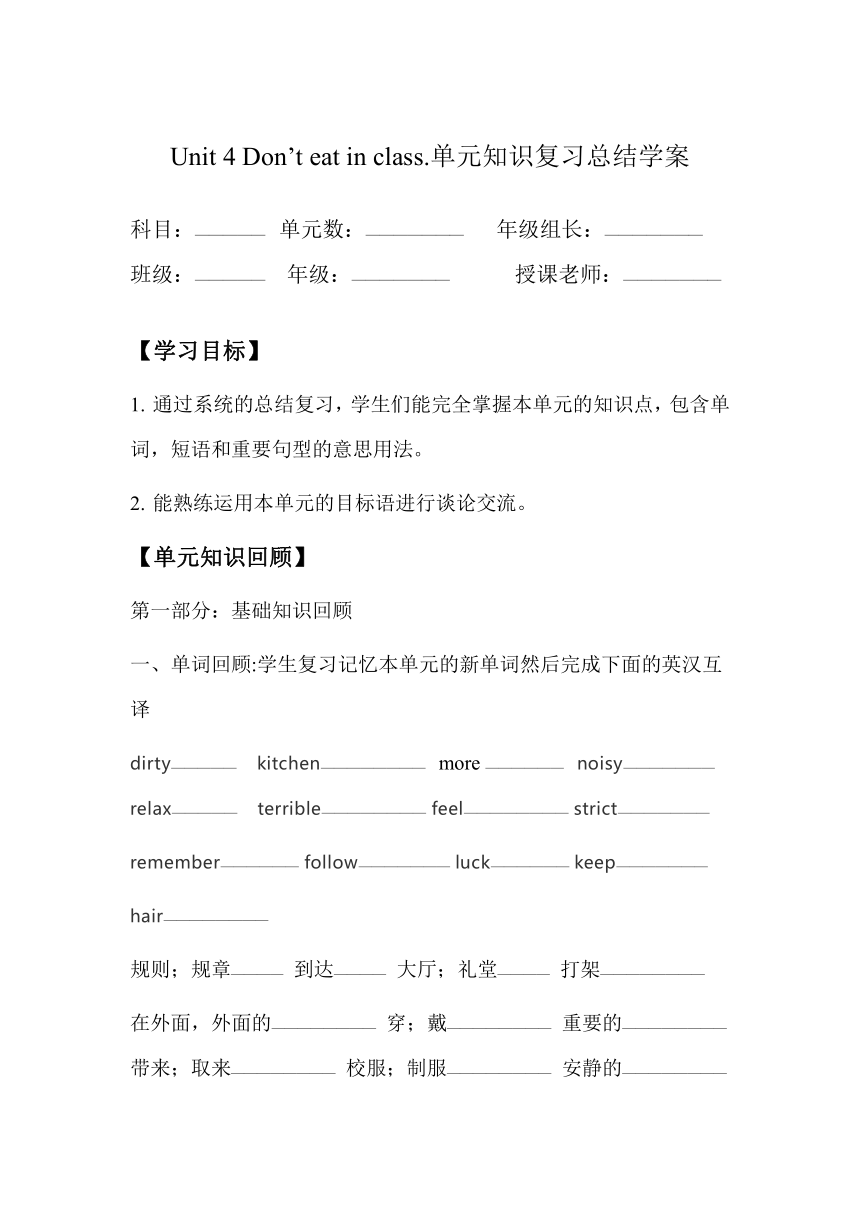 | |
| 格式 | zip | ||
| 文件大小 | 26.2KB | ||
| 资源类型 | 教案 | ||
| 版本资源 | 人教新目标(Go for it)版 | ||
| 科目 | 英语 | ||
| 更新时间 | 2022-03-22 13:38:05 | ||
图片预览

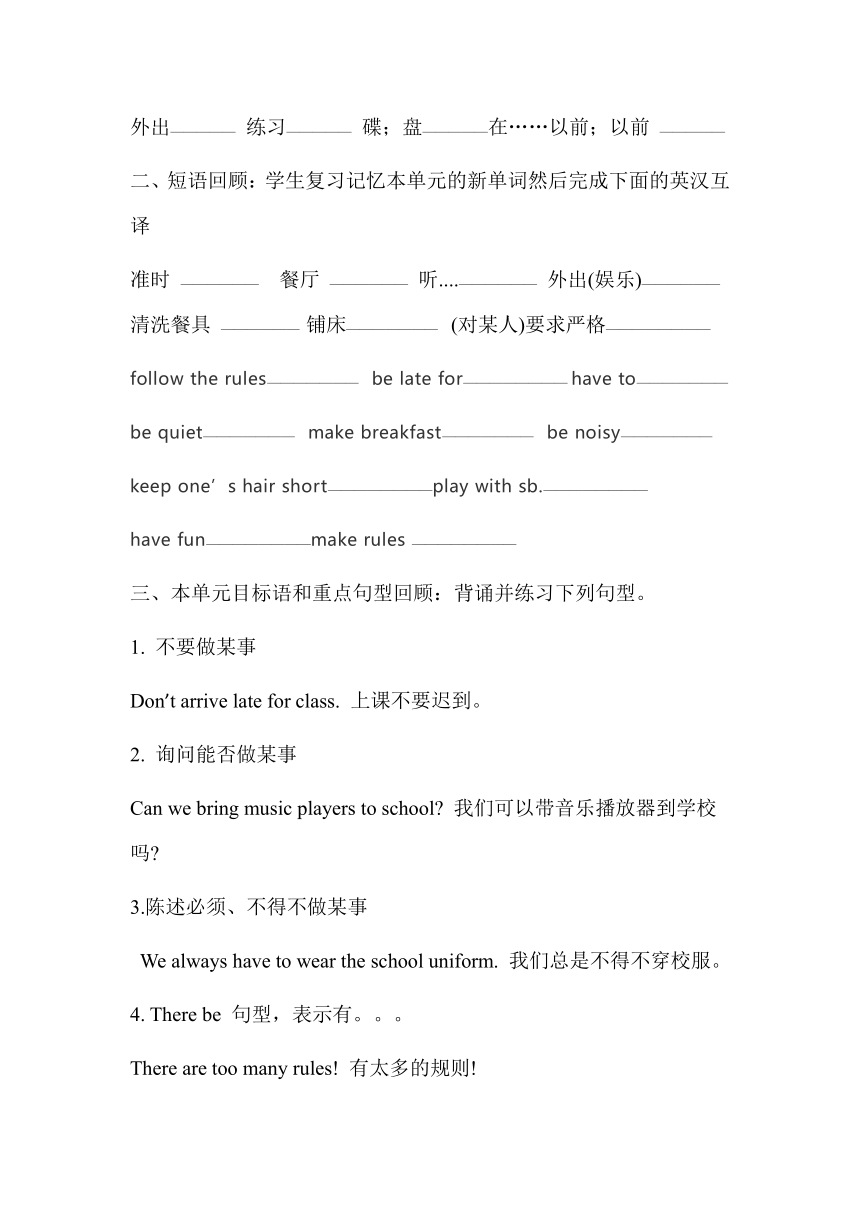
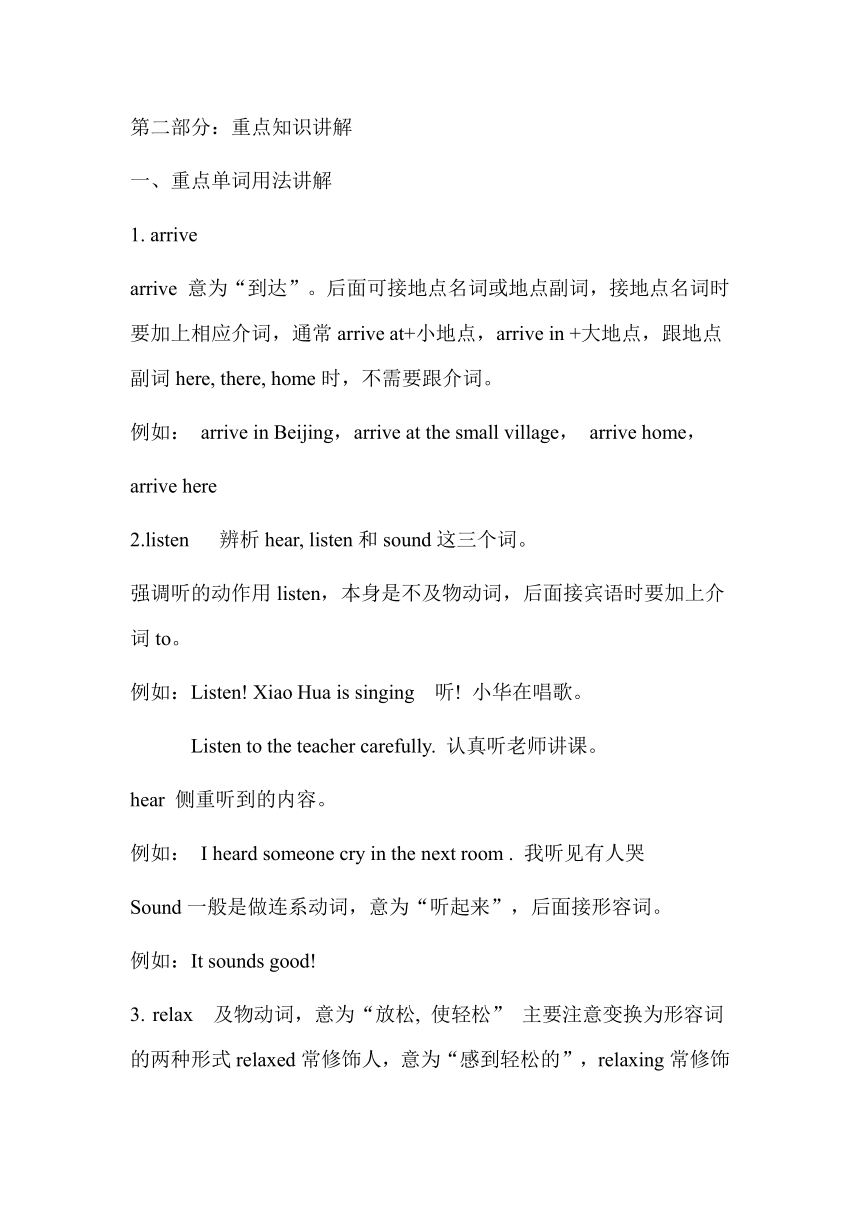
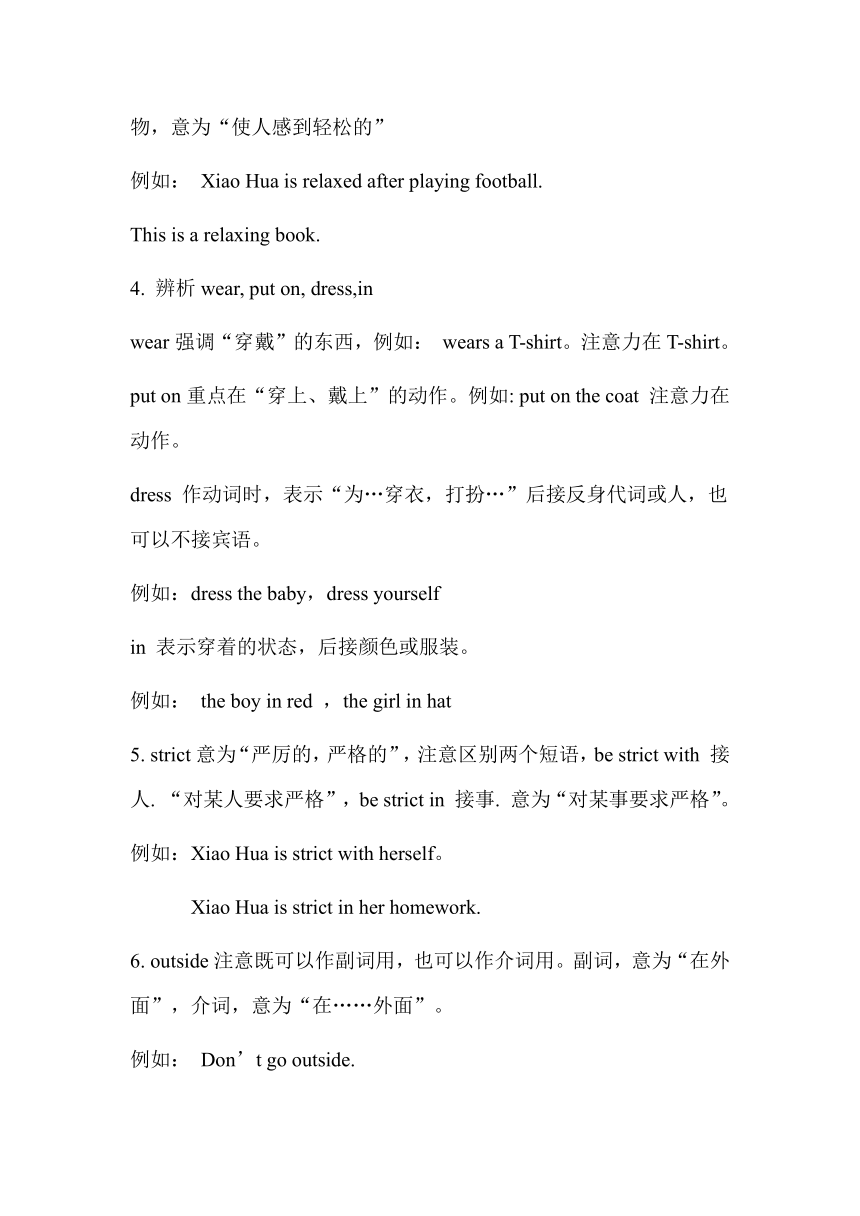
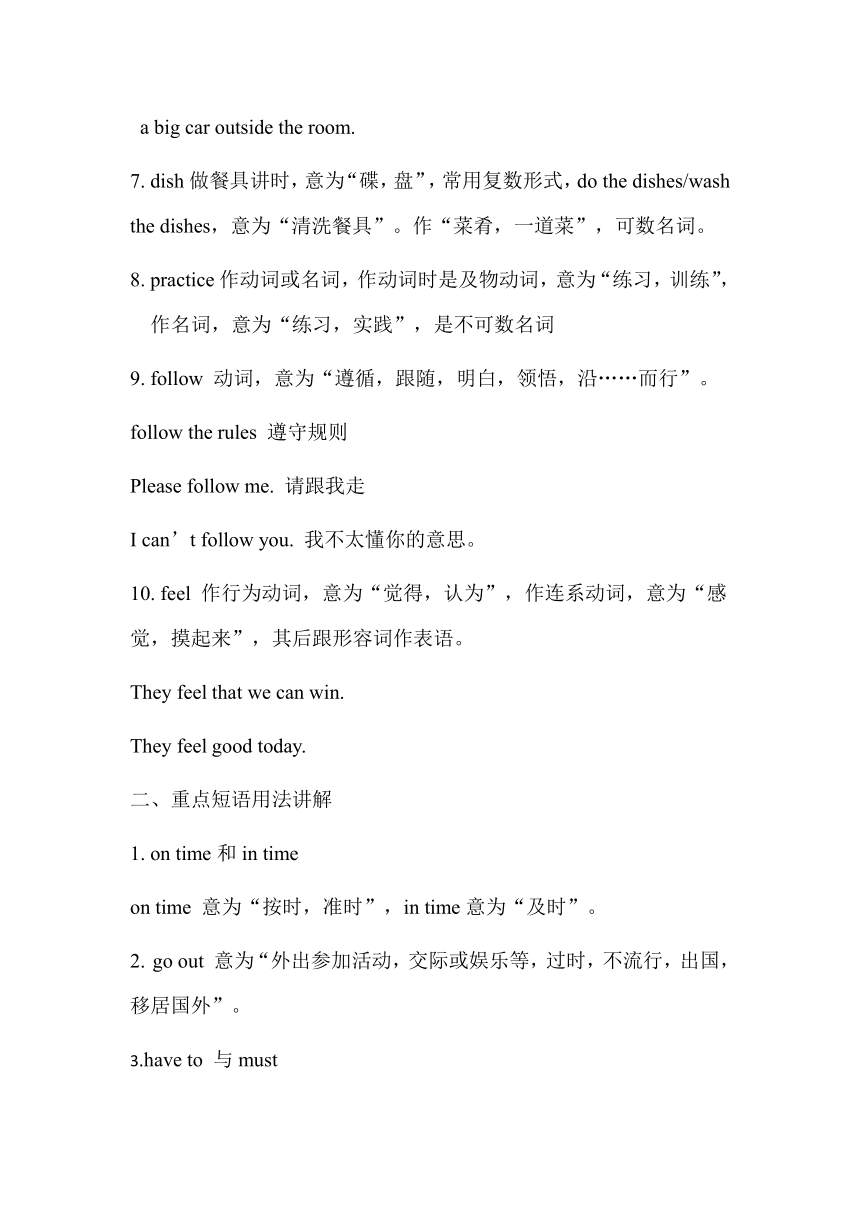
文档简介
Unit 4 Don’t eat in class.单元知识复习总结学案
科目:————— 单元数:——————— 年级组长:———————
班级:————— 年级:——————— 授课老师:———————
【学习目标】
通过系统的总结复习,学生们能完全掌握本单元的知识点,包含单词,短语和重要句型的意思用法。
能熟练运用本单元的目标语进行谈论交流。
【单元知识回顾】
第一部分:基础知识回顾
一、单词回顾:学生复习记忆本单元的新单词然后完成下面的英汉互译
dirty————— kitchen———————— more —————— noisy——————— relax————— terrible———————— feel———————— strict———————
remember—————— follow——————— luck—————— keep———————
hair————————
规则;规章———— 到达———— 大厅;礼堂———— 打架————————
在外面,外面的———————— 穿;戴———————— 重要的———————— 带来;取来———————— 校服;制服———————— 安静的———————— 外出————— 练习————— 碟;盘—————在……以前;以前 —————
二、短语回顾:学生复习记忆本单元的新单词然后完成下面的英汉互译
准时 —————— 餐厅 —————— 听....—————— 外出(娱乐)—————— 清洗餐具 —————— 铺床——————— (对某人)要求严格————————
follow the rules——————— be late for———————— have to———————
be quiet——————— make breakfast——————— be noisy———————
keep one’s hair short————————play with sb.————————
have fun————————make rules ————————
三、本单元目标语和重点句型回顾:背诵并练习下列句型。
1. 不要做某事
Don’t arrive late for class. 上课不要迟到。
2. 询问能否做某事
Can we bring music players to school 我们可以带音乐播放器到学校吗
3.陈述必须、不得不做某事
We always have to wear the school uniform. 我们总是不得不穿校服。
4. There be 句型,表示有。。。
There are too many rules! 有太多的规则!
第二部分:重点知识讲解
一、重点单词用法讲解
1. arrive
arrive 意为“到达”。后面可接地点名词或地点副词,接地点名词时要加上相应介词,通常arrive at+小地点,arrive in +大地点,跟地点副词here, there, home时,不需要跟介词。
例如: arrive in Beijing,arrive at the small village, arrive home,
arrive here
2.listen 辨析hear, listen和sound这三个词。
强调听的动作用listen,本身是不及物动词,后面接宾语时要加上介词to。
例如:Listen! Xiao Hua is singing 听! 小华在唱歌。
Listen to the teacher carefully. 认真听老师讲课。
hear 侧重听到的内容。
例如: I heard someone cry in the next room . 我听见有人哭
Sound一般是做连系动词,意为“听起来”,后面接形容词。
例如:It sounds good!
relax 及物动词,意为“放松, 使轻松” 主要注意变换为形容词的两种形式relaxed常修饰人,意为“感到轻松的”,relaxing常修饰物,意为“使人感到轻松的”
例如: Xiao Hua is relaxed after playing football.
This is a relaxing book.
4. 辨析wear, put on, dress,in
wear强调“穿戴”的东西,例如: wears a T-shirt。注意力在T-shirt。
put on重点在“穿上、戴上”的动作。例如: put on the coat 注意力在动作。
dress 作动词时,表示“为…穿衣,打扮…”后接反身代词或人,也可以不接宾语。
例如:dress the baby,dress yourself
in 表示穿着的状态,后接颜色或服装。
例如: the boy in red ,the girl in hat
5. strict意为“严厉的,严格的”,注意区别两个短语,be strict with 接人. “对某人要求严格”,be strict in 接事. 意为“对某事要求严格”。
例如:Xiao Hua is strict with herself。
Xiao Hua is strict in her homework.
6. outside注意既可以作副词用,也可以作介词用。副词,意为“在外面”,介词,意为“在……外面”。
例如: Don’t go outside.
a big car outside the room.
7. dish做餐具讲时,意为“碟,盘”,常用复数形式,do the dishes/wash the dishes,意为“清洗餐具”。作“菜肴,一道菜”,可数名词。
8. practice作动词或名词,作动词时是及物动词,意为“练习,训练”,作名词,意为“练习,实践”,是不可数名词
9. follow 动词,意为“遵循,跟随,明白,领悟,沿……而行”。
follow the rules 遵守规则
Please follow me. 请跟我走
I can’t follow you. 我不太懂你的意思。
10. feel 作行为动词,意为“觉得,认为”,作连系动词,意为“感觉,摸起来”,其后跟形容词作表语。
They feel that we can win.
They feel good today.
二、重点短语用法讲解
1. on time和in time
on time 意为“按时,准时”,in time意为“及时”。
go out 意为“外出参加活动,交际或娱乐等,过时,不流行,出国,移居国外”。
3.have to 与must
都是情态动词,后跟动词原形。have to 强调客观的需要,含有“不得不”的意思,must强调主观上自己认为有义务,有必要做某事。
They have to clean the room every day.
They must go now.
4.too many + 可数名词复数 太多的……或者too much + 不可数名词
too many people too much money
三、重点句型用法讲解
1. help sb. (to) do sth. 意为“帮助某人做某事”。
help既可以做动词也可以是名词,经常用的几种句型
1)help+宾语+带to或不带to的不定式做宾语补足语。例如: They often helps us (to) clean the room.
2)help sb. with sth. 意为“帮助某人做某事”。
3)with one’s help 意为“在某人的帮助下”。
2. There are too many rules! 有太多的规则!
There be 句型,意思是“有...”,要点在于be根据实际情况变化单复数形式和时态,例如:
There is a student in the classroom.
There are some students in the classroom.
There was a student in the classroom yesterday.
There were some students in the classroom yesterday.
四、语法知识讲解
1. Don’t eat in class.
祈使句表示请求、命令或者建议。祈使句的肯定式是“Do (实义动词) + 其他成份”, 谓语动词用原形,句子的主语you通常省略,句子结尾用句号,表示强烈语气的时候用感叹号.可以在句末或者句首加上please, 使语气更加的缓和客气。please 放在句首时后面不需要加逗号,放在句末时后面要加逗号。表示否定的祈使句,直接动词前加Don’t,例如:
Do your homework.
Do your homework, please.
Please do your homework.
Don’t do your homework.
Listen to me carefully!
Open the door!
2.情态动词的用法。
情态动词的基本用法:无人称和数的变化,情态动词后面跟的动词须用原形,否定式构成是在情态动词后面加 "not"。但有些情态动词有特殊情况。
can 意思是“能,能够,有能力”,变化成一般疑问句直接提前。
Can we bring music players to school
I can read this sentence in English.
have to 表示客观,意为不得不去做某事,有人称(has to)时态(had to)的变化
I have to keep my hair short.
And we always have to wear the school uniform.
must表示主观,是自发的认为必须做某事
We must go now.
第三部分:练习检测
一、根据括号中的汉语用适当的单词填空。
1. Your bedroom is very ______(脏), clean it.
2. Don’t stay _____(外面),Come in, please!
3. You must ______(遵守) the rules in the classroom.
4. She is______(严格)in her homework.
5. Do you do the ______ (洗盘子)after dinner
二、翻译下面的句子
1.不准上课迟到,你们务必守时。
___________________________________________________________
2.不准在课堂上听音乐。
___________________________________________________________
我们可以听音乐吗 我们不可以在走廊里听音乐,但在外面可以听。
___________________________________________________________
一我们可以把音乐播放器带到学校吗 不行,而且我们总是要穿着校服。
___________________________________________________________
一他在学校一定要穿校服吗 一是的,必须要穿校服。
___________________________________________________________
现在起床了,把床铺整理一下!
___________________________________________________________
别把脏碗留在厨房里!
___________________________________________________________
晚饭后我也不能放松。
___________________________________________________________
我必须十点前上床睡觉。
___________________________________________________________
他们制定规则来帮助我们。
___________________________________________________________
爸爸说我放学后不能打篮球,我必须做我的家庭作业。
___________________________________________________________
你有很多事情可以做。
___________________________________________________________
三、单项选择
1.We ____________ school on time every day.
A. don’t have to come B. don’t has to come
C. don’t have to come to D.don’t has to come to
2. We can’t play football on weekdays, but we _________ play it on weekends.
A. can B. can’t C. must D. has to
3. Help us _____ English,please.
A. with speak B. to learning C. speaking D. learn
4. _____ their homework after class.
A. Do to B. To do C. Do D. Doing
5. Don’t arrive late ________ meeting.
A. with B. from C .for
6. Don’t ________ and don’t _________ in classroom.
A. eat, noise B. to eat, to be noisy C. to eat, noise D. eat, be noisy
7. Teachers make rules ___________ us students, we must follow them.
A. helping B. to help C. help D to help to
8.-Must we do our homework right now -No, you _______.
A. needn’t B. can C. mustn’t D. can’t
9. She often _____ football with the classmates.
A. practice play B. practices play
C. practices playing D. practice playing
科目:————— 单元数:——————— 年级组长:———————
班级:————— 年级:——————— 授课老师:———————
【学习目标】
通过系统的总结复习,学生们能完全掌握本单元的知识点,包含单词,短语和重要句型的意思用法。
能熟练运用本单元的目标语进行谈论交流。
【单元知识回顾】
第一部分:基础知识回顾
一、单词回顾:学生复习记忆本单元的新单词然后完成下面的英汉互译
dirty————— kitchen———————— more —————— noisy——————— relax————— terrible———————— feel———————— strict———————
remember—————— follow——————— luck—————— keep———————
hair————————
规则;规章———— 到达———— 大厅;礼堂———— 打架————————
在外面,外面的———————— 穿;戴———————— 重要的———————— 带来;取来———————— 校服;制服———————— 安静的———————— 外出————— 练习————— 碟;盘—————在……以前;以前 —————
二、短语回顾:学生复习记忆本单元的新单词然后完成下面的英汉互译
准时 —————— 餐厅 —————— 听....—————— 外出(娱乐)—————— 清洗餐具 —————— 铺床——————— (对某人)要求严格————————
follow the rules——————— be late for———————— have to———————
be quiet——————— make breakfast——————— be noisy———————
keep one’s hair short————————play with sb.————————
have fun————————make rules ————————
三、本单元目标语和重点句型回顾:背诵并练习下列句型。
1. 不要做某事
Don’t arrive late for class. 上课不要迟到。
2. 询问能否做某事
Can we bring music players to school 我们可以带音乐播放器到学校吗
3.陈述必须、不得不做某事
We always have to wear the school uniform. 我们总是不得不穿校服。
4. There be 句型,表示有。。。
There are too many rules! 有太多的规则!
第二部分:重点知识讲解
一、重点单词用法讲解
1. arrive
arrive 意为“到达”。后面可接地点名词或地点副词,接地点名词时要加上相应介词,通常arrive at+小地点,arrive in +大地点,跟地点副词here, there, home时,不需要跟介词。
例如: arrive in Beijing,arrive at the small village, arrive home,
arrive here
2.listen 辨析hear, listen和sound这三个词。
强调听的动作用listen,本身是不及物动词,后面接宾语时要加上介词to。
例如:Listen! Xiao Hua is singing 听! 小华在唱歌。
Listen to the teacher carefully. 认真听老师讲课。
hear 侧重听到的内容。
例如: I heard someone cry in the next room . 我听见有人哭
Sound一般是做连系动词,意为“听起来”,后面接形容词。
例如:It sounds good!
relax 及物动词,意为“放松, 使轻松” 主要注意变换为形容词的两种形式relaxed常修饰人,意为“感到轻松的”,relaxing常修饰物,意为“使人感到轻松的”
例如: Xiao Hua is relaxed after playing football.
This is a relaxing book.
4. 辨析wear, put on, dress,in
wear强调“穿戴”的东西,例如: wears a T-shirt。注意力在T-shirt。
put on重点在“穿上、戴上”的动作。例如: put on the coat 注意力在动作。
dress 作动词时,表示“为…穿衣,打扮…”后接反身代词或人,也可以不接宾语。
例如:dress the baby,dress yourself
in 表示穿着的状态,后接颜色或服装。
例如: the boy in red ,the girl in hat
5. strict意为“严厉的,严格的”,注意区别两个短语,be strict with 接人. “对某人要求严格”,be strict in 接事. 意为“对某事要求严格”。
例如:Xiao Hua is strict with herself。
Xiao Hua is strict in her homework.
6. outside注意既可以作副词用,也可以作介词用。副词,意为“在外面”,介词,意为“在……外面”。
例如: Don’t go outside.
a big car outside the room.
7. dish做餐具讲时,意为“碟,盘”,常用复数形式,do the dishes/wash the dishes,意为“清洗餐具”。作“菜肴,一道菜”,可数名词。
8. practice作动词或名词,作动词时是及物动词,意为“练习,训练”,作名词,意为“练习,实践”,是不可数名词
9. follow 动词,意为“遵循,跟随,明白,领悟,沿……而行”。
follow the rules 遵守规则
Please follow me. 请跟我走
I can’t follow you. 我不太懂你的意思。
10. feel 作行为动词,意为“觉得,认为”,作连系动词,意为“感觉,摸起来”,其后跟形容词作表语。
They feel that we can win.
They feel good today.
二、重点短语用法讲解
1. on time和in time
on time 意为“按时,准时”,in time意为“及时”。
go out 意为“外出参加活动,交际或娱乐等,过时,不流行,出国,移居国外”。
3.have to 与must
都是情态动词,后跟动词原形。have to 强调客观的需要,含有“不得不”的意思,must强调主观上自己认为有义务,有必要做某事。
They have to clean the room every day.
They must go now.
4.too many + 可数名词复数 太多的……或者too much + 不可数名词
too many people too much money
三、重点句型用法讲解
1. help sb. (to) do sth. 意为“帮助某人做某事”。
help既可以做动词也可以是名词,经常用的几种句型
1)help+宾语+带to或不带to的不定式做宾语补足语。例如: They often helps us (to) clean the room.
2)help sb. with sth. 意为“帮助某人做某事”。
3)with one’s help 意为“在某人的帮助下”。
2. There are too many rules! 有太多的规则!
There be 句型,意思是“有...”,要点在于be根据实际情况变化单复数形式和时态,例如:
There is a student in the classroom.
There are some students in the classroom.
There was a student in the classroom yesterday.
There were some students in the classroom yesterday.
四、语法知识讲解
1. Don’t eat in class.
祈使句表示请求、命令或者建议。祈使句的肯定式是“Do (实义动词) + 其他成份”, 谓语动词用原形,句子的主语you通常省略,句子结尾用句号,表示强烈语气的时候用感叹号.可以在句末或者句首加上please, 使语气更加的缓和客气。please 放在句首时后面不需要加逗号,放在句末时后面要加逗号。表示否定的祈使句,直接动词前加Don’t,例如:
Do your homework.
Do your homework, please.
Please do your homework.
Don’t do your homework.
Listen to me carefully!
Open the door!
2.情态动词的用法。
情态动词的基本用法:无人称和数的变化,情态动词后面跟的动词须用原形,否定式构成是在情态动词后面加 "not"。但有些情态动词有特殊情况。
can 意思是“能,能够,有能力”,变化成一般疑问句直接提前。
Can we bring music players to school
I can read this sentence in English.
have to 表示客观,意为不得不去做某事,有人称(has to)时态(had to)的变化
I have to keep my hair short.
And we always have to wear the school uniform.
must表示主观,是自发的认为必须做某事
We must go now.
第三部分:练习检测
一、根据括号中的汉语用适当的单词填空。
1. Your bedroom is very ______(脏), clean it.
2. Don’t stay _____(外面),Come in, please!
3. You must ______(遵守) the rules in the classroom.
4. She is______(严格)in her homework.
5. Do you do the ______ (洗盘子)after dinner
二、翻译下面的句子
1.不准上课迟到,你们务必守时。
___________________________________________________________
2.不准在课堂上听音乐。
___________________________________________________________
我们可以听音乐吗 我们不可以在走廊里听音乐,但在外面可以听。
___________________________________________________________
一我们可以把音乐播放器带到学校吗 不行,而且我们总是要穿着校服。
___________________________________________________________
一他在学校一定要穿校服吗 一是的,必须要穿校服。
___________________________________________________________
现在起床了,把床铺整理一下!
___________________________________________________________
别把脏碗留在厨房里!
___________________________________________________________
晚饭后我也不能放松。
___________________________________________________________
我必须十点前上床睡觉。
___________________________________________________________
他们制定规则来帮助我们。
___________________________________________________________
爸爸说我放学后不能打篮球,我必须做我的家庭作业。
___________________________________________________________
你有很多事情可以做。
___________________________________________________________
三、单项选择
1.We ____________ school on time every day.
A. don’t have to come B. don’t has to come
C. don’t have to come to D.don’t has to come to
2. We can’t play football on weekdays, but we _________ play it on weekends.
A. can B. can’t C. must D. has to
3. Help us _____ English,please.
A. with speak B. to learning C. speaking D. learn
4. _____ their homework after class.
A. Do to B. To do C. Do D. Doing
5. Don’t arrive late ________ meeting.
A. with B. from C .for
6. Don’t ________ and don’t _________ in classroom.
A. eat, noise B. to eat, to be noisy C. to eat, noise D. eat, be noisy
7. Teachers make rules ___________ us students, we must follow them.
A. helping B. to help C. help D to help to
8.-Must we do our homework right now -No, you _______.
A. needn’t B. can C. mustn’t D. can’t
9. She often _____ football with the classmates.
A. practice play B. practices play
C. practices playing D. practice playing
同课章节目录
- Unit 1 Can you play the guitar?
- Section A
- Section B
- Unit 2 What time do you go to school?
- Section A
- Section B
- Unit 3 How do you get to school?
- Section A
- Section B
- Unit 4 Don't eat in class.
- Section A
- Section B
- Unit 5 Why do you like pandas?
- Section A
- Section B
- Unit 6 I'm watching TV.
- Section A
- Section B
- Review of Units 1-6
- Unit 7 It's raining!
- Section A
- Section B
- Unit 8 Is there a post office near here?
- Section A
- Section B
- Unit 9 What does he look like?
- Section A
- Section B
- Unit 10 I'd like some noodles.
- Section A
- Section B
- Unit 11 How was your school trip?
- Section A
- Section B
- Unit 12 What did you do last weekend?
- Section A
- Section B
